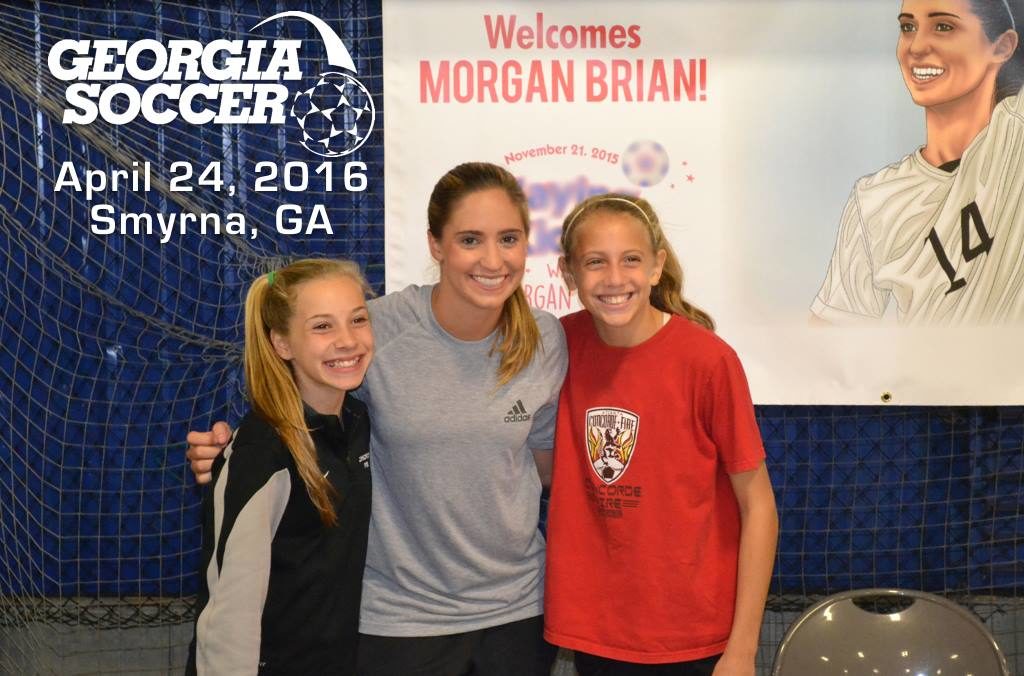Leaders in American Youth Soccer: Georgia’s Greg Griffith
The people who run large soccer organizations are best positioned to make long-lasting improvements in the game — benefiting both youth players and coaches. Youth soccer is big business in the USA. Embracing the challenges of running a non-profit organization in a highly commercialized youth sports market requires experience and intelligence. SoccerToday’s series on Leaders in American Youth Soccer takes a look at the people who are making a difference.
Greg Griffith became the Executive Director of Georgia Soccer in January, 2014 after working for 4 years at the U.S. Soccer Foundation. Passionate about soccer and the state of Georgia, Griffith is one of the people who are changing the landscape of youth soccer and raising the standards of the game. Griffith was a high level college player who graduated when there were few professional opportunities to play the game he loves. Dedicated to providing opportunities for all youth soccer players who want to play the beautiful game, Griffith’s remarkable experience and extraordinary depth of understanding of the game is leading his US Youth Soccer state into a bright future.
 Diane Scavuzzo: Georgia is a passionate and flourishing state with soccer played on many levels. What is your philosophy on growing the game of soccer in Georgia? How has participation in the game increased in the last few years?
Diane Scavuzzo: Georgia is a passionate and flourishing state with soccer played on many levels. What is your philosophy on growing the game of soccer in Georgia? How has participation in the game increased in the last few years?
Greg Griffith: Youth soccer in Georgia has grown by 12% since I started. With the addition of the new MLS team, Atlanta United, we believe excitement and awareness will generate more growth.
Atlanta is also expected to grow by 2 million with a higher percentage of Hispanics in that population, and this kind of growth will benefit Georgia Soccer. I have recently focused a lot of energy on advocating for more field space for our member clubs. Field space is a limiting factor to growth for clubs in the Atlanta area right now and that is where 70% of the soccer is in Georgia. If you want to play you can find a club using our club locator: Just type in your zip code and find a club near you!
 Diane Scavuzzo: As Executive Director of US Youth Soccer’s State of Georgia, how big is your annual budget – and how large is your staff?
Diane Scavuzzo: As Executive Director of US Youth Soccer’s State of Georgia, how big is your annual budget – and how large is your staff?
Greg Griffith: We have 12 staff and a $3.5 million budget. We are the largest youth sports organization in Georgia and growing!
Diane Scavuzzo: How has soccer changed since you became involved?
Greg Griffith: When I first started playing soccer it was all volunteer based and none of our parents knew the game or the rules. Now, most of the parents on the sideline have played soccer and many travel teams have professional coaches. This has helped players get better and better every year.
Diane Scavuzzo: Have you ever played soccer?
Greg Griffith: Yes, I played from the age of 5 years old. I was the captain of my college team at James Madison University, a Division 1 program. Unfortunately, when I graduated from college, there was no MLS or NASL, so professional opportunities were not available.
Diane Scavuzzo: Have you ever coached soccer?
Greg Griffith: Yes, I have coached my two sons for six years and I even coached a small college club team while I was in college. I love coaching and want to do more of it when my kids go to college, but right now I want to have the time to see them play soccer more than I want to coach.
Diane Scavuzzo: You have worked with the U.S. Soccer Foundation, please let us know what you did….
Greg Griffith: I worked at the U.S. Soccer Foundation for four years and it was at a pivotal time for the organization. They had a new CEO who wanted to start funding programs, but they did not have enough money to do so. I came in and helped create a program called Soccer for Success which now reaches over 30,000 children a year in urban, low income areas where soccer did not previously exist. I led a team that was able to develop new funding sources to fund this program from scratch.
Diane Scavuzzo: What do you think U.S. Soccer needs to do to help soccer be more successful in the USA?
Greg Griffith:
We need to develop a soccer identity in this country.
Germany, Brazil, England, Spain, Italy, Jamaica and most other countries have soccer identities; we need one to know what kind of team we want to field at the national team level.
The other thing U.S. Soccer needs to do is to add more players from Georgia on the men’s team.
They have three Georgia players on the women’s team and they are the Gold medal favorites! Just think what the men’s team could do with three Georgia players on it. You only need to look at the U17 team to see the potential!
Diane Scavuzzo: How is your State Cup?
Greg Griffith: We have a Georgia Soccer State Cup and a Division 2 and Division 3 state championship. Our Division 2 champion can go on to play in the President’s Cup. We have over 400 teams participate in these championships.
Many of our State Champions go on to Regional Championships because we have strong teams. Our Regional Premier league teams are also doing very well, National league teams too!
We have several Premier league and national league champions from Georgia. We hope to have one or two national championships this summer to bring home to Georgia! A listing of former State Cup champions can be found on our State cup website.
We also run an Academy Cup for champions ages U9-U12, and a Recreational Cup state championship.
Diane Scavuzzo: Who is your DOC for Georgia?
Greg Griffith: Jacob Daniel has been the Director of Coaching for Georgia Soccer for 23 years. Jacob has done a great job of making coaching education a priority in Georgia and this is reflected by Georgia having one of the highest rates of licensed coaches in the country.
We offer free Georgia Soccer F & G coaching licenses for recreational coaches.
Diane Scavuzzo: What is the biggest problem in youth soccer today?
Greg Griffith: Challenges to youth soccer today include cost and field space. In Georgia, we are the largest youth sport, we do not want parks to be built with more baseball fields than soccer fields, parks should have more soccer fields to match the number of youth playing soccer.
The cost of the sport limits some from playing.
Unlike the rest of the world, our clubs are not compensated when a player they develop becomes a professional. We need that to change so that the success of players who are developed at a youth club helps fund the development of the next generation, just as it is done in the rest of the world.
Another challenge that we have in Georgia is not enough colleges offer men’s soccer. We would love for Georgia Tech and the University of Georgia to have varsity men’s soccer. We hope that will happen one day.
 Diane Scavuzzo: What do you want to achieve in the next 12 months? The next 24 months?
Diane Scavuzzo: What do you want to achieve in the next 12 months? The next 24 months?
Greg Griffith: We would like to see more soccer fields and large soccer complexes built in Georgia in the next 24 months. We are working diligently to try to get some large complexes built around the Atlanta metro area. This should help our growth and allow for regional tournaments to come to Georgia.
Diane Scavuzzo: U.S. Soccer mandates – how much impact has the new Birth Year Mandate had?
Greg Griffith: For most of us who work in soccer, this has been a major issue we have had to deal with as it will impact every team in the country, even if your team stays together you will play in a new age group.
Georgia Soccer clubs have been very proactive on this issue. Some people hate change, but after we get through tryouts, we will get to go back to focusing on playing soccer!
Diane Scavuzzo: How confused do you think the typical soccer mom and dad are about the numerous paths in youth soccer for player development?
Greg Griffith: I think Mom’s and Dad’s are confused about the opportunities for their child in soccer when they first start out. I think that everyone should start out playing recreational soccer. If you do, then you can talk to your club where you play about all the different opportunities they offer like travel teams, Regional premier league teams, and the ODP program through Georgia Soccer.
I think clubs do a great job of letting players know about programs they should consider at the appropriate time. The perceived problem is they do not share that information when you are starting out so it leads to parents feeling like they do not know enough.
 Diane Scavuzzo: As an executive in the world of youth soccer, what do you consider to be your most difficult accomplishment?
Diane Scavuzzo: As an executive in the world of youth soccer, what do you consider to be your most difficult accomplishment?
Greg Griffith: I am very proud that I help start the Soccer for Success program. Having been at Georgia Soccer for only two years, I hope the best is yet to come! I wish I could spend more time coaching my sons, but I have turned that over to the professionals and have to watch from the sidelines.
Diane Scavuzzo: Who is your greatest role model or mentor, either personally or as a coach?
Greg Griffith: I was lucky to have a great youth coach and a great youth team that made it a lot of fun to play. So thank you Chuck Heath! I also had a great high school coach that was very passionate and allowed us to be passionate about playing, thank you Scott Mack!
 Diane Scavuzzo: If you could pick any superpower, what would it be and why?
Diane Scavuzzo: If you could pick any superpower, what would it be and why?
Greg Griffith: I have really bad knees now, so being able to play soccer again would be a super power I wish I had!
Diane Scavuzzo: Who is your favorite soccer team? Who do you root for behind closed doors?
Greg Griffith: My two favorite teams are my two son’s teams. I also cheer for the Georgia Soccer state champions at regionals and nationals. In March of 2017, I will add Atlanta United to that list of favorites! I used to live near Washington DC but I had a hard time rooting for DC United because I used to play against the players and the Coach of DC United when they first started as an MLS team. They were my rivals, how could I cheer for them?
Now, I hope Atlanta United can beat DC United every year!








